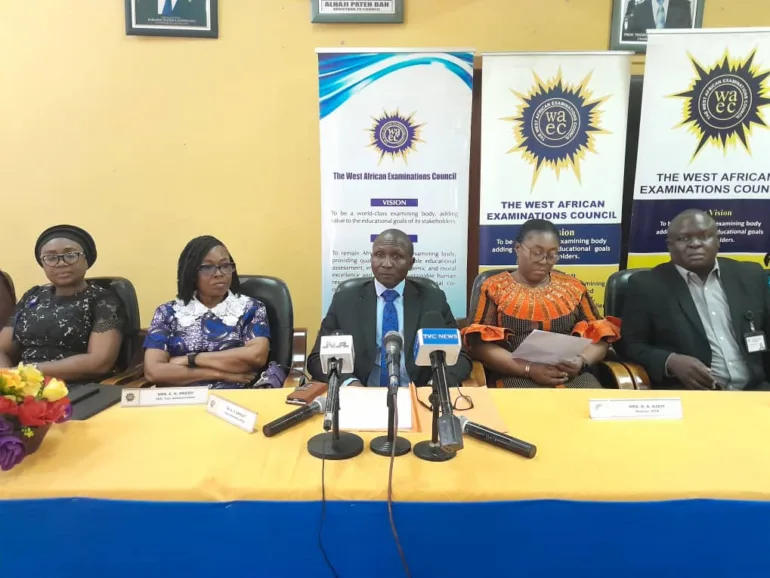The West African Examinations Council (WAEC), Nigeria, has released revised results for the 2025 West African Senior School Certificate Examination (WASSCE) for school candidates, following the discovery of grading errors that significantly impacted overall performance statistics.
At a press briefing on Friday at the Council’s national office in Yaba, Lagos, WAEC Nigeria Head Dr. Amos Dangut acknowledged a serious marking error involving serialised exam papers, which led to the misrepresentation of candidates’ results.
“On behalf of the Registrar, Management, and Staff of WAEC Nigeria, I sincerely apologise for the grading discrepancies uncovered in the serialised papers. This is an embarrassing admission for us, but one we must make,” Dangut said.
The Council had recently introduced a new security feature — paper serialisation — modeled after a system used by another national examination body. However, post-exam reviews revealed that the English Language Objective Test (Paper 3) was graded using incorrect answer keys due to a misassigned serialised code file.
Other affected subjects included Mathematics, Biology, and Economics.
“Our investigation confirmed that an incorrect serialised code file was used in printing the English Language Objective paper, resulting in the use of wrong answer keys during grading. Importantly, candidates who took the exam via the computer-based format were not impacted,” Dangut explained.
With corrections applied, 1,794,821 candidates (91.14%) achieved credits or above in at least five subjects (with or without English and Mathematics). Notably, 1,239,884 candidates (62.96%) earned five credits including English and Mathematics, a significant increase from the initially reported 38.32%.
Among these, 657,819 (53.05%) were female candidates, and 582,065 (46.95%) were male. Despite the improvement, this represents a 9.16% decline from the 72.12% recorded in 2024.
A total of 1,969,313 candidates sat for the exam, including those from schools in Benin Republic, Côte d’Ivoire, and Equatorial Guinea that follow the Nigerian curriculum. The Council also accommodated 12,178 special needs candidates, including visually impaired (112), hearing impaired (615), physically challenged (37), and spastic/mentally challenged (52) students — all of whose results have been processed and released.
“Every candidate was adequately supported during the exam administration,” Dangut affirmed.
Currently, results for 1,763,470 candidates (89.55%) have been fully processed, while 205,916 (10.45%) have pending subjects due to technical issues. WAEC is working to resolve these delays and release outstanding results soon.
Meanwhile, results for 191,053 candidates (9.7%) have been withheld amid ongoing investigations into alleged exam malpractice — a reduction from the 11.92% recorded in 2024. Affected candidates may seek redress at waecinternational.org/complaints.
“WAEC remains committed to sanctioning all malpractice cases. Collective efforts are essential to maintain the integrity of our examination system,” Dangut emphasized.
Candidates are encouraged to access their results via the official portal www.waecdirect.org and apply for digital certificates, which will be available within 48 hours after result verification. Hard copy certificates will be ready within 90 days.
Dangut also reminded that candidates sponsored by state governments with outstanding debts will not have access to their results until payments are settled. “We urge the concerned authorities to facilitate timely clearance so affected candidates can receive their results,” he said.
Offering an unreserved apology to all stakeholders, Dangut acknowledged the distress caused to candidates, parents, educators, Ministries of Education, and the media.
“This has been a challenging period for WAEC. We are fully committed to ensuring such issues do not recur,” he concluded.
The Council also expressed gratitude to the Federal Government, the Minister of Education, and state education bodies for their support throughout the review and resolution process.


